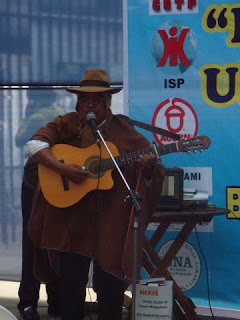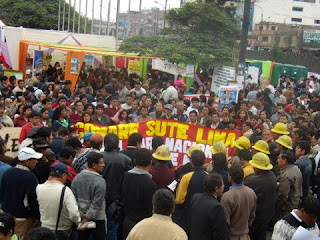The LAC-EU summit started today. I’m watching the presidents arriving and the initial speeches on the TV as I type. According to the press, the Peruvian Government are saying that concrete agreements on climate change will be prioritised in the Lima Declaration to be signed by the parties, but that poverty reduction measures will probably appear as vaguer 'priorities' rather than set targets.
The negotiations have begun with the Peruvian government emphasising that it would like to negotiate a separate free trade agreement with the EU, rather than in combination the Andean Community of Nations (CAN). CAN is divided because whilst the right-wing governments of Peru and Colombia are keen, left leaning presidents in Ecuador and Bolivia are against signing. Europe wants to negotiate with the whole block. At the alternative summit of course there is strong resistance to free trade agreements.
This afternoon a delegation from the alternative summit took proposals gathered from the summit events up until now to present to representatives of each region at the official summit. As well as presenting some of the conclusions they also voiced disappointment at the ‘demonisation’ of the alternative summit as a violent ‘antisummit’ by the Peruvian government and the media and stressed that they sought dialogue and offered alternatives and proposals. They said it was wrong for such important discussion to take place in a closed meeting.
Alternative summit
The alternative summit today was even more packed than it has been up until now as today and tomorrow were declared impromptu public holidays to try to encourage people to leave the city. When we arrived an enormous queue of people were waiting to register for the summit and all day long, every workshop was bursting with people.

Water us a Human Right, An Ecological Good and a Public Service
I spent most of the day in a forum on water as a human right organised by a range of Peruvian organisations ( mostly trade union and campesino organizations) including FENTAP The National Peruvian Federation of Drinking Water Workers, CGTP, CCP, CONACAMI, CAN, CxD, Public Services International, CONAGUAYVIDA and FOS.
I was keen to hear the key concerns and issues for people as it is one of the key issues Progressio is researching for our international advocacy work. It was also interesting to contrast the concerns and demands with those made at the Fifth National Water Meeting in Ecuador.
It seemed to me that whilst the political context in Ecuador and Peru are very different, the concerns of the grassroots organisations are centred around the same issues and for both groups the issue of water is a vital issue – literally a life and death issue as people reiterated all day.
The difference is that whilst in Ecuador our partner organisation Cameren and the Water Resources Forum has been working on proposals many of which look likely to be included in the new constitution; in Peru, small scale farmers face a new set of legislative proposals being put forward by Alan Garcia’s government including a new water law, which they see as a huge threat (seeking to further privatise water, favour big companies, and turn water into merchandise over which they will lose control).
The issues which came up over and over again were: that water is a human right; that water should be managed by public institutions and that we should fight against privatisation and measures which seek to convert water into merchandise – with tradeable rights etc; that policies should favour the small scale farmers who are subsidising food production with their labour and not the agro-exportation industry which is environmentally and socially destructive; the need for policies which respect ancestral uses of water and cultural beliefs and management practices in relation to water; the need to resolve unfair water distribution in which transnational companies (extractive industries and agricultural) are awarded disproportionately large shares; the already frightening impacts of climate change on water supplies and fears for the future; the threat of agro-fuels; the impacts of deforestation; the inadequacy of social responsibility as a regulation model for industry.
There was vehement consensus that water should not be included in any free trade negotiations at the LAC-EU summit As Carlos Franco from CONAGUAyVIDA said:
“Water should not enter into the LAC- EU negotiations. They are negotiating with our lives. They need to give campesinos back control over water”
Miguel Jugo from APRODEH , a human rights orgainsation talked about water as a fundamental human right for all - for urban populations and for agriculture. He emphasised the importance of the role of the state – “The state cannot pretend that water conflicts can be fairly resolved between the parties because the players are not equal – in a situation of transnational company versus communities, the company will win”. He argued that the government is failing in its responsibility to equitably distribute water resources: in Lima “some have no water at all whilst others have it in navigable quantities”.
Mario Pallacios from CONACAMI, the Confederation of Communities Affected by Mining talked about the mining industry’s huge demand for water, saying that every metric tonne of soil, metal and rock removed requires 3,000 litres of water to process. In his community 80% of the water is used by mining industry who extract 8,000 metric tones a day. In Yanacocha the figure is even higher with the gold mine there extracting 600,000 metric tonnes a day. He gave powerful examples of the devastating effect this is having on the environment.
Mario Pallacios

David Boys
---------------------------------------------------
Over the last few days, I had been thinking it was amazing to get over 3,000 people to attend an event like this, reflecting on how important the issues must be to so many people. But, after lunch I realised what could really draw a crowd. We were headed towards a climate change forum and were passed by a crowd of thousands heading in the other direction. Convinced I must be missing out on the most interesting talk of the summit, I asked where everyone was going: it turned out that the Bolivian President Evo Morales, had arrived for his football game against the Peruvian national team who played in the World Cup in Mexico in 1970. The stadium was soon packed out with hundreds clamouring outside the university gates being held back bypolice. As we left there were rumours that Chavez was shortly coming to join him.


Crowds and queues outside the Univeristy gates






No comments:
Post a Comment